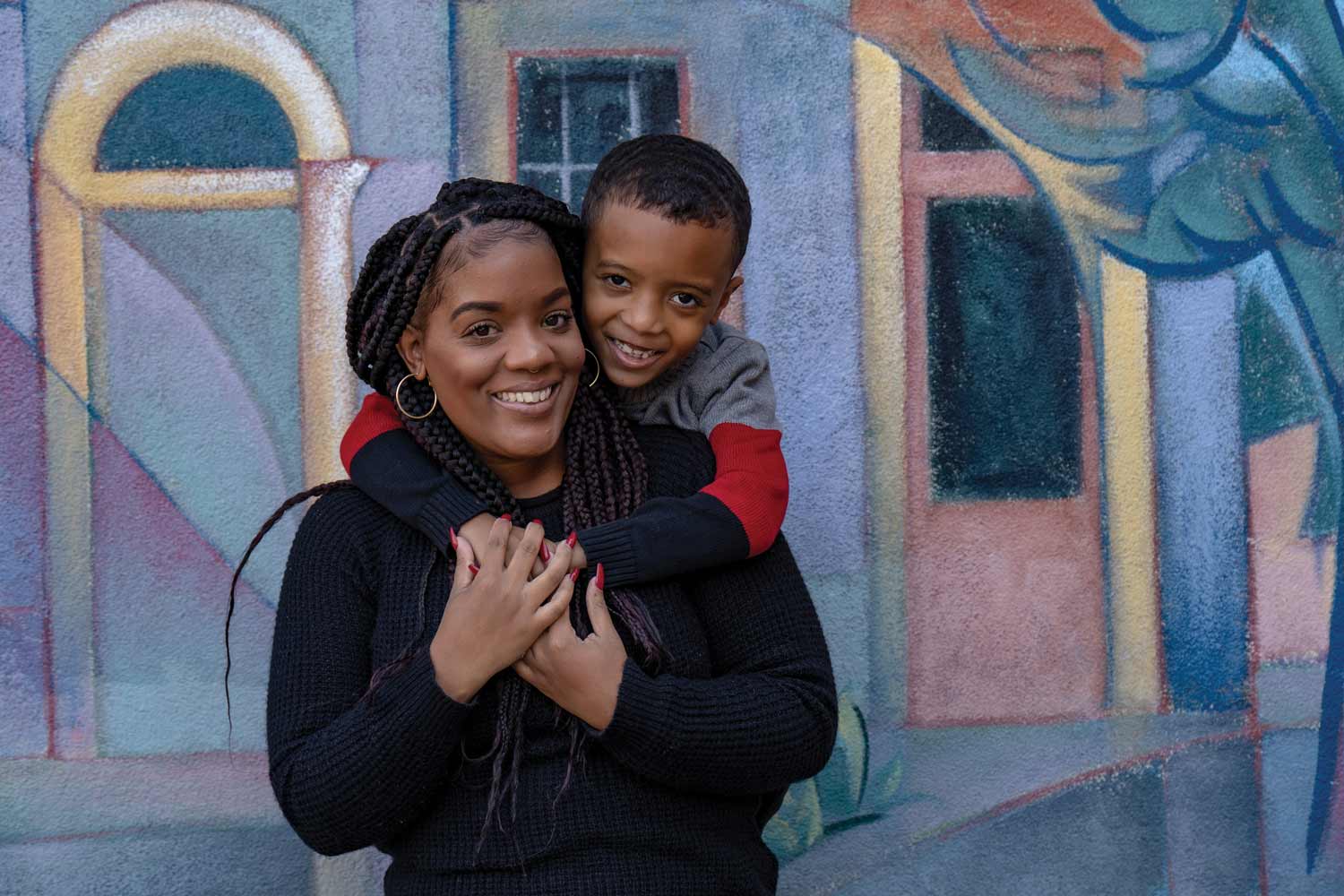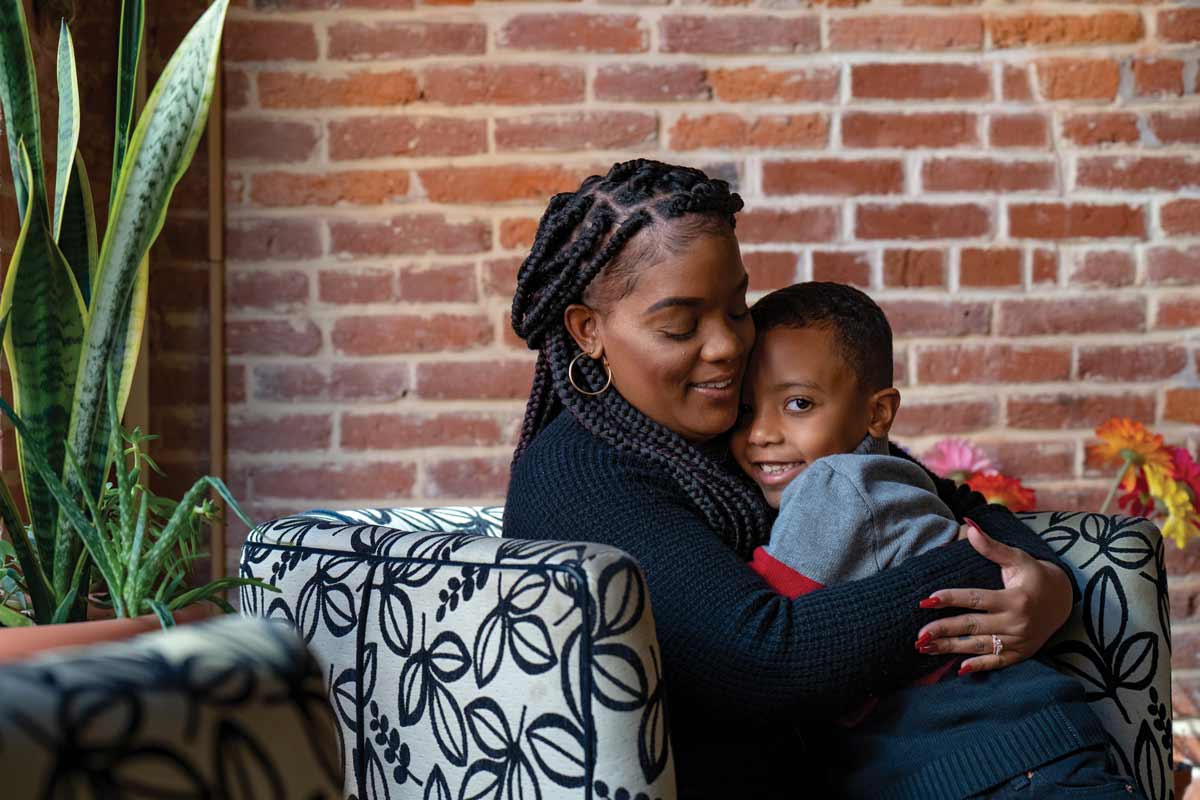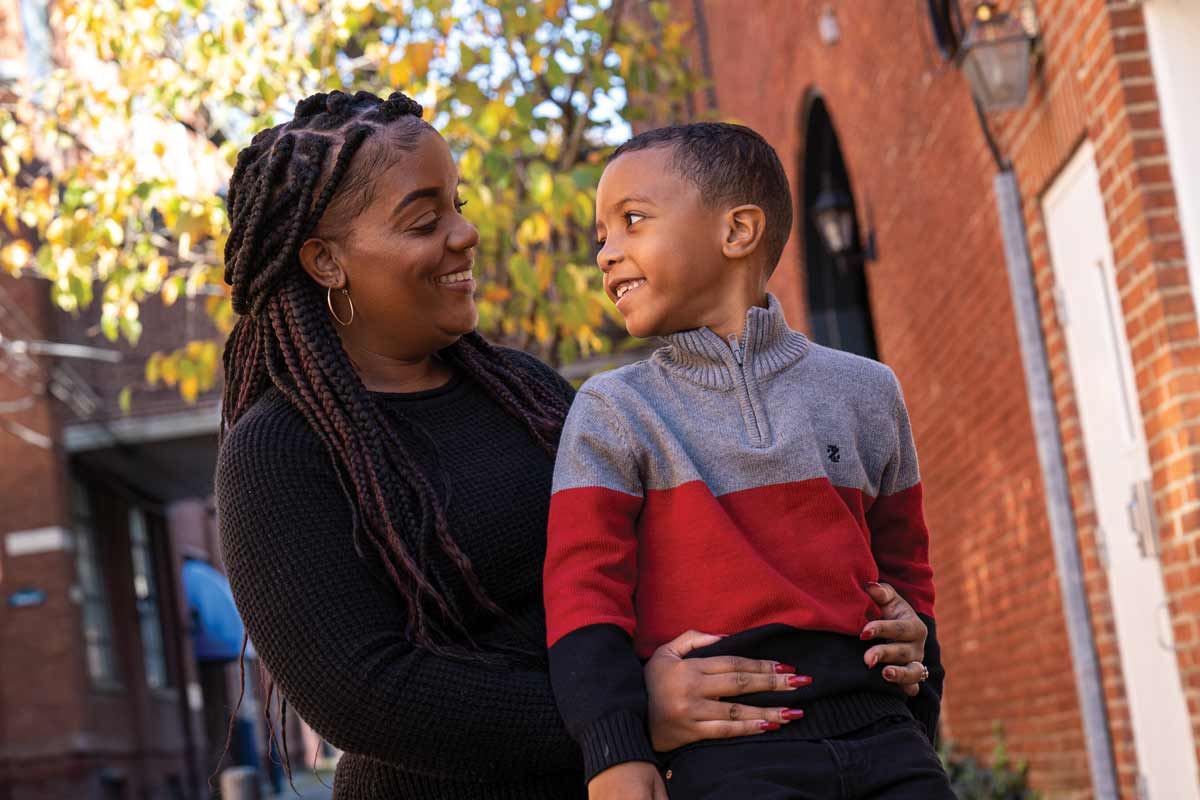The events of the past year have created a ripple effect, reaching nearly all aspects of our lives. The COVID-19 pandemic fundamentally changed the ways we go about our lives, including how we gather, learn, communicate, work and so much more. It has been a challenging time as an adult; one can only imagine how difficult it has been for children.

Shanece Bowman, who is the programs manager at Lancaster Osteopathic Health Foundation, and her six-year-old son, Royce, often have open conversations about the events of the past year, including the pandemic, the election and racial inequity.
The pandemic has caused drastic changes in their routines. Most schools transitioned to hybrid or virtual learning. Kids aren’t able to socialize and play with their friends and classmates like they once did. Milestone birthdays, graduations and holidays pass by, deprived of the proper togetherness and celebration they deserve. In the age of constant information and greater access to screens, a seemingly never-ending flow of scary headlines and polarized debates inundate their feeds and notifications. For some children, having the whole family spend more time at home means a higher risk of abuse, as well as potential food and housing insecurity.
Childhood experiences create a foundation for lifelong physical and behavioral health. The events of the past year are out of our control, but we can help to steer the youth around us towards habits and resources for mental well-being. How children learn to cope with hardship can stay with them throughout the rest of their lives. Now more than ever, it is crucial to check in on the mental health of the children and adolescents in our lives and offer resources and guidance for when they need help.
Lancaster Osteopathic Health Foundation
Lancaster Osteopathic Health Foundation (LOHF) is one such resource for families in our community. Their vision is for all local youth to experience mental well-being. They strive to make behavioral healthcare and mental health services accessible for every family in the county. Treatment and care for mental health-related issues can vary depending on the nature and severity of a person’s mental condition, their physical health and the type of treatment that is needed. The most common services include outpatient, hospital inpatient and, due to the pandemic, telehealth care.

Creating a supportive environment for children to express their thoughts and feelings is crucial for their mental well-being. Shanece encourages parents to have open and honest conversations about mental health with their children.
LOHF helps local families access these services, mainly through their copay assistance program. Programs Manager Shanece Bowman works directly with eligible families and providers to lower copays to $10 per visit, which allows families to continue services without having to worry about the financial strain or burden. Thanks to a Lancaster Cares grant, LOHF was able to expand eligibility for their copay assistance program to any Lancaster County resident whose income was affected by COVID-19. LOHF will be continuing this expanded eligibility throughout the duration of the pandemic.
In total, LOHF has seven programs to help families access behavioral healthcare, provide training and certification services for aspiring behavioral healthcare workers and distribute grants to local nonprofits that are working to make lasting changes in the system.
Before joining the LOHF team, Shanece worked as a behavioral health assistant, which introduced her to issues within the field that she is passionate about fixing. She sees her position at LOHF as an opportunity for enacting change. “At a micro level, we can help individuals and families; at a mezzo level, we can work in communities; and at a macro level, we can help change policies in human services,” she says. “I learned quickly within my position at LOHF that in order to be impactful, you have to work at all three levels.”

Shanece’s ultimate goal as a mother is to instill morals and respect for all others, no matter the differences they may have.
Fixing the System
High copays and financial strain aren’t the only issues facing local families seeking behavioral healthcare. Access to services is often encumbered by long wait periods, lack of diversity in the workforce, unawareness of resources and stigma surrounding mental health. Through their programs, LOHF hopes to eliminate these barriers.
One of Shanece’s top priorities is working to eliminate the stigma surrounding mental illness, which often discourages people from getting help. “If you have a broken arm or a headache, it is so easy to go to the doctor and tell them what is wrong. But, how often do we go to the doctor and tell them about feelings of loneliness or negative thoughts? Getting mental health services should be as easy as it is to go to your primary doctor for a checkup,” Shanece laments. “That comfortability is just not there.”
In order to reduce the stigma, Shanece believes that we must change the way we talk about behavioral health. When someone is struggling, we need to address, understand and validate their feelings, rather than sweeping them under the rug or reducing them to just being “crazy.” Changing the stigma can start with our own children; giving them the resources and tools to speak about their behavioral health can set them up to lead healthier and happier lives.

Shanece wants to be visible to the minority community, to other mothers and to young individuals who feel like nobody looks like them.
The demand for youth behavioral healthcare is already high and will most likely continue to rise as our society works to change the stigma around seeking help. Investing in a stronger and more diverse talent pipeline is crucial for the future of the industry. Obstacles like supervision hours and funding for training or education often stand in the way of aspiring clinical professionals and social workers getting licensed. LOHF offers several programs to help remove these barriers and create a larger workforce.
Due to the lack of diversity in the field, minority communities are not represented effectively. When seeking services, most people want to find a provider they can relate to or else they may not feel completely comfortable opening up. “In my position and as a minority myself, I want to be visible to the minority community, to the mothers and to the young individual who feels like nobody looks like them,” Shanece explains. “I want to be that person who can empathize with those who have suppressed mental health issues and allow them to break the chain of silence.”
Talking to Children About Mental Health
The past year has brought up a lot of difficult conversations for parents and children, revolving around public health, racial inequity and politics. A mother herself, Shanece understands how hard these conversations can be; she’s had many with her 6-year-old son, Royce. Explaining to a child that they can’t go to school or see their friends or family is not easy. Even harder yet is explaining the heartbreaking stories on the news or the uncertainty of when things will go back to normal, if they ever do.
“Just be honest and have those difficult conversations with your children, because it is going to affect the way they communicate with you in the future,” Shanece says. Creating an open and supportive environment for children to express their thoughts and feelings is crucial for their mental well-being.
Signs that a child may be struggling mentally include low energy, lack of enthusiasm, sleep issues, asking difficult questions, intrusive thoughts or worries and loss of appetite. Shanece recommends addressing these behaviors as soon as you notice them. “Don’t brush it off as a bad day or an off week,” she says. “You have that gut feeling as a parent that something is off or going on.” If your child seems to be struggling, Shanece recommends getting on their level both physically and mentally and simply asking if they are feeling all right in their mind.
Tips for Nurturing Children’s Mental Health
Be honest. Shanece emphasizes the importance of being transparent with children while having these important discussions. In the midst of the uncertainty, allow yourself to say that you don’t know what will happen. It’s fine to not have all the answers; being able to listen and give the best answer you can is what’s important.
Validate their feelings. “Allow them to say, ‘I don’t like what’s going on.’ Because that’s okay. I don’t think anyone does,” Shanece notes. A lot of people are struggling. Reassure them that they are not alone in how they feel.
Create healthy habits. Help kids develop outlets for maintaining and relieving stress. We all need to have hobbies, interests or activities to take our minds off the weight of the world. These habits can be as simple as getting outside for daily walks or cooking a favorite recipe as a family.
Enforce limits on screen time. Increased exposure to social media or news broadcasts can fatigue children’s minds. In regard to her own son, “I want to allow him to know what’s going on, but I also don’t want to overwhelm him with such negativity. There has to be a balance,” Shanece explains.
Create a routine. Routines can promote a sense of control for kids, which can help reduce anxiety. While their school and social routines are disrupted, try to create a new schedule with them.
Reassure them that they are safe. Remind your child that there are good people out there – doctors, nurses and other frontline workers – who are working tirelessly to take care of others and help bring an end to the pandemic.
Getting Help
COVID-19 has made access to mental health services more challenging but Shanece emphasizes that there are indeed resources out there for families struggling with the effects of the past year. Telehealth and other remote services are available as the pandemic persists. LOHF is one of many organizations in Lancaster County that are dedicated to advocating for mental health services and accessibility. These organizations can help connect you to providers, offer financial assistance or create space for you to talk with others experiencing similar challenges.
Learn more about LOHF and their services on their website, lohf.org, or by calling 717-397-8722. For more information on mental health services in Lancaster, visit letstalklancaster.org. In the case of a mental health emergency, contact Lancaster Crisis Intervention at 717-394-2631.






SHARE
PRINT